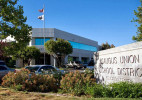 With everything going on in the world today, it’s wise to be prepared for any emergency.
With everything going on in the world today, it’s wise to be prepared for any emergency.
You can start by building an emergency kit. In it you should include a basic first aid kit, essential medications for everyone in your family, non-perishable food, a manual can opener, one gallon of water (minimum) per person per day; you will need to plan for at least a week, but if you have room, store water for a month.
You will also need a good pair of protective shoes, comfortable clothing, rain gear, sleeping bags, emergency cash, a battery-powered radio, a flashlight, extra batteries, pet supplies, a whistle, dust masks, plastic sheeting to shelter in place, moist wipes, garbage bags with plastic ties, wag bags, copies of insurance papers, copies of any important documents such as insurance policies, medical records, band records, etc.
You will also need tools to turn off gas, electricity and water valves, and the knowledge to be able to perform these tasks. Develop a plan with your family and include things like where to meet if you are separated.
 It’s also wise to prepare yourself and other family members for an emergency by taking a first aid class, CPR, and possibly a CERT class. You could be the first responder for your entire neighborhood. The more knowledge you have, the better the outcome.
It’s also wise to prepare yourself and other family members for an emergency by taking a first aid class, CPR, and possibly a CERT class. You could be the first responder for your entire neighborhood. The more knowledge you have, the better the outcome.
Think about making your home a safer place to be. Strap down your water heater, televisions, filing cabinets, china cabinets and any other heavy cabinets that might cause damage if they fell over. Install smoke detectors in every room in your house. Make sure your first aid kit and other supplies are easily accessible. Also remember to provide an emergency kit for every vehicle in your family. There is no guarantee you will be home in the time of an emergency.
A personal locator is something every member of your family should have. My favorite one is called a SPOT. This is a small device you carry with you at all times. If you’re buried in an avalanche, in a building after an earthquake, or any other scenario, all you need to do is push 911, and a satellite signal goes out to the nearest sheriff station, ranger station, etc., and they will be able to find you anywhere. This device could easily save your life.
Clean water, healthy food, and clean air are essential to everyone’s survival.
Devise a plan for every scenario, and practice your plan with your family. Make sure everyone is comfortable with the plan, especially children. Don’t assume every responsibility yourself. What would happen if you were unconscious? Every member of the family needs to learn how to shut off the utilities, how and when to evacuate, and how to apply first aid.
Create a communications list with important phone numbers for family members and out-of-town family. If your children are in day care, find out what their emergency plans are so you will be able to reunite with your children.
 Here is a list of important numbers to add to your emergency list:
Here is a list of important numbers to add to your emergency list:
* Life threatening emergency: 911
* Sheriff: 661-255-1121
* Calif. Poison Control: 800-876-4766
* Caltrans Road Conditions: 800 -427-7623
* Southern California Edison: 800-611-1911
* The Gas Co.: 800-427-2200
* L.A. County Animal Care and Control: 661-257-3101
Also, prepare for your pets. If you have an animal as a pet, you should make sure you pack food for that animal, a drinking bowl, a leash, a habitat, a lead, bridle or whatever your pet would need to be comfortable and well-kept in an emergency.
Make sure you also add the veterinarian’s phone number to your emergency list. Larger animals, such as horses, might need to be placed temporarily in safe quarters. Depending upon where you live, know the facilities that could accept your horse, and have those phone numbers handy.
Lastly, make friends with your neighbors. If you are away from home when an emergency strikes, a neighbor can help attend to your children and your animals.
Be prepared for all possible scenarios. It’s a good thing.
Dianne Erskine-Hellrigel is executive director of the Community Hiking Club and president of the Santa Clara River Watershed Conservancy. Contact Dianne through communityhikingclub.org or at zuliebear@aol.com.

Like this:
Like Loading...
Related





 Tweet This
Tweet This Facebook
Facebook Digg This
Digg This Bookmark
Bookmark Stumble
Stumble RSS
RSS












































REAL NAMES ONLY: All posters must use their real individual or business name. This applies equally to Twitter account holders who use a nickname.
2 Comments
Great reminder to all. The more people that prepare in advance, the less panic there will be amongst the populace. I recommend taking the local CERT class if time permits.
I also suggest if possible to keep your emergency supplies outside the house. If you can’t gain entry, you can’t access your gear. At least keep tools outside in a shed. Another thing, stash small bills in your gear. During the 94 quake, milk was sold for $20 a gallon as the shopkeepers didn’t have small change and if you wanted milk…or you bought a bunch of stuff you didn’t want or need to make up that $20.